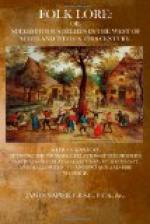Some nations in addition to a personal formula for laying the ghosts of departed relatives, had a national ritual for ghost-laying, a public feast in honour of departed spirits. Such a feast is still held in China, and also in Burmah. In 1875 the following placard was posted throughout the district of Rangoon, proclaiming a feast of forty-nine days by order of the Emperor of China:—
“There will this year be scarcity of rice and plenty of sickness. Evil spirits will descend to examine and inquire into the sickness. If people do not believe this, many will die in September and October. Should any people call on you at midnight, do not answer; it is not a human being that calls, but an evil spirit. Do not be wicked, but be good.”
But I do not propose to write a treatise on Pagan theology, nor do I propose to trace in historical detail the progress through which Christian and Pagan beliefs have in process of time become assimilated, when I have occasion, I may notice these things. I intend, as I said at the beginning, to deal with superstition, no matter from what source it may have arisen, recognising superstition to be as already defined—beliefs and practices founded upon erroneous ideas of God and the laws of nature. In many things, I believe, we are yet too superstitious, and our popular theology, instead of aiding to destroy these erroneous beliefs, aids them in maintaining their vitality. Orthodox Christians believe in a general and also in a special providence; the ancients, on the other hand, believed that all events were under the control and direction of separate and special divinities, so that when praying for certain results, they addressed the divinity having control over that phenomenon or circumstance by which they were affected, and when their desires were gratified, they expressed their thankfulness by offerings to that divinity. If their desires were not granted, they regarded that circumstance as a token of displeasure on the part of that divinity, and besought the aid of their priests and sooth-sayers to discover the reason of his anger, and offered sacrifices and peace offerings. Now, orthodox Christians in the same circumstances pray to God for special and personal blessings, and when they are granted, they feel grateful, and sometimes express their gratitude. A common method of expressing this gratitude is by giving something to the church. Thus we find in our church records entries like the following:—
From —— ——, As a thank-offering for the recovery L S. D. of a dear child. ------- " —— ——, Peace-offering for reconciliation with an old friend. ------- " —— ——, Offering for the preservation of a friend going abroad. ------- " —— ——, Thank-offering for a fortunate transaction in business. -------
Such offerings are remarked upon favourably by the leaders of the Church, and regarded as examples worthy




